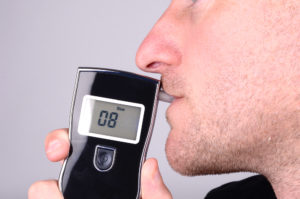Legally Reviewed By:
Brian P. Gabriel, Esquire
 DUI suspects across the country face serious penalties upon a conviction. What does it take for a police officer to arrest a DUI suspect? Usually, a police officer’s reasonable suspicion that the suspect is impaired with alcohol or drugs is sufficient. In Florida, results from the preliminary breath test conducted on the side of the road are not permissible as evidence in court unless you are under 21 years old. Once a suspect is arrested, police take him to the county jail for more complete testing.
DUI suspects across the country face serious penalties upon a conviction. What does it take for a police officer to arrest a DUI suspect? Usually, a police officer’s reasonable suspicion that the suspect is impaired with alcohol or drugs is sufficient. In Florida, results from the preliminary breath test conducted on the side of the road are not permissible as evidence in court unless you are under 21 years old. Once a suspect is arrested, police take him to the county jail for more complete testing.
Reasonable Suspicion of DUI
An officer must have reasonable suspicion that a driver is under the influence before he may pull the driver over and look for clues that a driver is inebriated. Reasonable suspicion of DUI often stems from a driver’s behavior. An officer who observes the following may claim reasonable suspicion of DUI:
- The driver is slower than other motorists or driving below the speed limit
- The driver is erratic and swerving
- The driver nearly hits other cars or objects
- The driver fails to obey traffic signals
- The driver frequently steps on the brakes for no apparent reason
Reasonable suspicion of DUI differs from probable cause. An officer requires reasonable suspicion to conduct a traffic stop and a DUI investigation; however, once his findings indicate that the driver is likely under the influence, he has probable cause of DUI and may arrest the driver.
Refusing a Breathalyzer Test
The issue of whether to refuse or submit to the breathalyzer test completed on the Intoxilyzer 8000 is hotly debated. While some defense attorneys believe that no one should provide evidence to be used against him (and thereby voiding 5th Amendment rights), because of implied consent laws all licensed drivers must submit to testing or there are legal repercussions. Refusing a breathalyzer test in Florida can lead to the automatic suspension of your license for up to a full year, not to mention that by refusing you may upset the officer and face additional charges for impeding an investigation.
Many people may choose to refuse the breath test simply because of the drawbacks associated with the I-8000 machines approved for evidentiary use in the state of Florida. Defense attorneys across the state have discovered a multitude of flaws that cause the machines to produce inaccurate results.
Whether you should refuse a breath test or not truly depends on the unique circumstances of your case. In general, it is best to comply with law enforcement requests because there are consequences for refusing a breath test at a DUI stop. Ultimately, law enforcement officers may not use physical force to get you to submit to the test. In fact, any evidence of police brutality against you can be used against the officer in court. In addition, it is possible to request that evidence acquired unlawfully be suppressed.
Do Police Need a Warrant to Test My Breath?
Law enforcement personnel do not need a search warrant to test your breath in any of the 50 states. In Birchfield v. North Dakota (2016), the high court considered three separate DUI cases in which three defendants were prosecuted or threatened with prosecution for refusing a blood or breath test.
After evaluating all three cases, the court came to the conclusion that it is constitutional for police officers to issue breath tests without warrants, as a breath test is not an “intrusive” procedure such as a blood draw or urine test. Unlike a blood test, which can reveal much more information about a person than simply his blood alcohol concentration, a breath test measures the approximate level of alcohol in the breath.
Talk to a DUI Attorney Right Away!
If you are stopped for DUI in West Palm Beach, it’s important to remember that you gave consent previously when you signed for your driver’s license. You may incur penalties for refusing to submit to a breath test, including a mandatory license suspension of one year for your first refusal of the test. If the officer sees that you have previously refused a breath test for a DUI stop, you will face a misdemeanor charge and secondary license suspension of 18 months. Jail time is also possible. Do not face the criminal justice system alone. A dedicated DUI attorney can help you fight the criminal charge and license suspension.
Attorney Brian Gabriel has aggressively fought DUI charges in West Palm Beach and surrounding areas for more than 30 years. You can have confidence in him to investigate each aspect of your case and provide quality representation. Call 561-622-5575 for a free legal consultation or complete a contact form.



